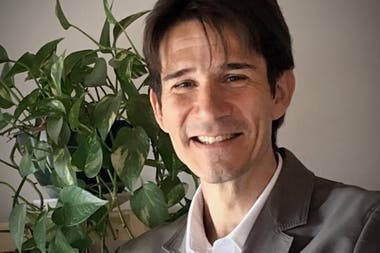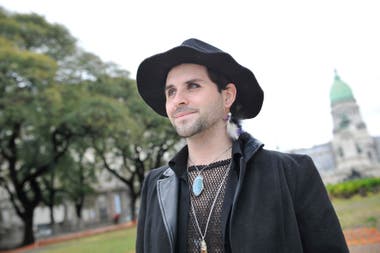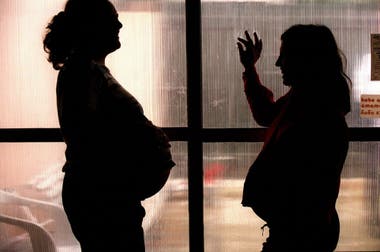
For Tomás Olivieri Acosta, who for almost two decades has dedicated himself to studying death and voluntarily accompanying people at the end of life, the case of Solange Musse, the 35-year-old woman who died at the end of last week in Córdoba without being able to see her father, represents much more than the violation of an elementary right. “It is an X-ray of who we are as a society. It is inhumane that there are people who die alone“says the social entrepreneur and fellow of Ashoka.
Along these lines, he stresses that in the current context, “emotional, bond and family wounds are being generated that will take years to repair.” Starting from the idea that death It is the “most vital, culminating, transcendental and intimate moment that human beings have”, Olivieri Acosta puts his finger on the sore of a paradox: at the same time, it is the one that we care the least and for which we are least prepared. The entrepreneur, who is married to Romina, has a two-year-old daughter and a boy on the way, considers that speaking from childhood about death, a topic that is still taboo today, is one of the keys to generating a change in consciousness . “We are light years away from understanding what a good dying process is,” he says.
Why do you consider Solange’s case an X-ray of our society?
We are light years away from understanding what a process of good dying is, a mourning and what it means to accompany situations of suffering. There is no awareness that death is the most important, transcendental and intimate moment of a person. Solange’s case is an X-ray of what we are in relation to the little compassion and empathy we have in the face of the suffering of others. What the pandemic did was bring to light how little evolved we are in that frequency and not to mention death, which is something that we still have not assimilated or healed under any point of view.
City: the law is passed so that relatives can accompany critical patients
What is the greatest fear that the thought of death arouses in us?
When you ask someone to project their death, the thing that generates the most anxiety and fear in any human being – whether or not they are sick, and I’m talking to you since before the pandemic – is loneliness at the moment of death. It is one of the most primal and manifest fears. That fear is being embodied in a negligence and pride that were in evidence during the pandemic.
The current context returned to the nightmare of death in solitude as something much more palpable.
What I highlight as positive is that it brought us to death head on. On the one hand, the awareness that we are passing through was awakened; but, on the other hand, the insanity that there are people who die alone came to light. Nobody deserves to go through that, what is happening is inhuman. What is most distressing in the pandemic is not only that you can die, but under what conditions: this is aberrant, it should not happen and it is happening with great naturalness. Part of my job is to emotionally accompany doctors and nurses, who are in contact with Covid patients all day: they come in to see them, with the corresponding security measures, they leave and continue to live. Thus, there is no pretext beyond fear, pride and collective ignorance to prevent a family member from being next to a person who dies. We have no idea of the importance of that moment and the need not only for the person who dies, but also for the person who has to grieve and survive that death. We are generating emotional, bonding and family wounds that will take years to repair.
You always speak of death as the most momentous moment in a person’s life, what does it imply to revalue it and give it the entity it should have?
It implies, first, that we culturally incorporate death as part of life. Although the pandemic strips us in the face of death, it also strips us of how little prepared and incorporated we have to finitude. In 1990, the WHO established as a fundamental right of any person at the end of life to be accompanied, not to die alone. The moment of death is the most vital, culminating, transcendental and intimate that we human beings have, and it is the one that we care the least and for which we are least prepared.
His vocation to accompany people at the end of life was born from a personal experience. What was and what does this task of accompanying consist of?
A few years ago, a brother of mine, Agustín, had an accident: he fell from a mountain, was unconscious for 15 minutes and died in the arms of a person who was with him. When I found out that I had died in the arms of someone and not alone, I felt a lot of gratitude and peace. That’s when this vocation woke me up. The best way to accompany someone is to be present. A person who is going through the last days, weeks or months of his life, what he most needs is someone who can listen to him and, sometimes, also do it from silence. The challenge is that you can find a valid interlocutor with whom you feel you can open whatever you need, with the freedom that whoever is listening is prepared for that.
How do we prepare for death?
It involves asking ourselves: what do I want to feel when I die? Usually what most people say is “peace.” When I go back to the here and now, a second question must be asked: do I have peace at this moment? If the answer is “yes” really, it is because I am living; If the answer is “no”, which is what happens to most, it is because there is something that I am not fulfilling in my life. To practice dying is to know that I am today and tomorrow I do not know, and if I am not going to be tomorrow, am I ready for that? Once a girl told me something in a workshop that I loved: “My grandfather every day when he goes to work, he gives my grandmother two kisses: one because she is leaving …” and the other, do you know why?
In case it doesn’t come back?
Exactly. From the day we are born, we begin to die. If every day we had a clock that reminds us how many minutes we have left, we will be able to reflect, for example, if the conversation we are having or the program we are watching really add something to our lives. Death connects you with life.
Is death still a taboo subject today?
Until a while ago, there were two socially taboo subjects: one was sex and the other was death. Sex stopped being sex, but death still is. People’s first regret before they die is: “I wish I had encouraged myself to be who I wanted to be and not who others expected me to be.” Let it not happen to us that we have to wait to be told that we have three months to live to start living for real: let’s start today.
Where does this paradigm shift begin to occur?
We have to start culturally to understand death as part of life. It still happens to me a lot to accompany people who do not use the word “death” or “cancer”. We continue to use phrases like “we must fight the disease”, “we must beat cancer” and, for some health professionals, death is still seen as a failure. But we are never going to beat death: death is not fought, from the day we were born, it has already won us.
Should that idea be started from the first years?
Totally. Incorporating death into our lives is a job that we have to do from the first moment, from the earliest ages, because it is the transience and the ephemerality of life that gives meaning to our passage through this world. Every decision we make should be anchored in that thought. Ask ourselves: what I am doing today, this person I choose to marry, this career that I am going to study, what is it going to contribute to me when I die? Peace, happiness, fulfillment, disturbance? Do we ask ourselves that question?
Would that change in social outlook, allow that in the future there are no cases like Solange’s?
There would no longer be cases like Solange’s because the person who sees that father who is going to see his daughter is going to do the impossible so that she can get there, because it is a matter of will. We are so denied death and we are such an unsympathetic society to bank on the suffering of others, that that person who prevented her from coming, I think she did not even do the exercise of putting herself in her place.
More information
At the end of life: Since 2004, and on a voluntary basis, Tomás Olivieri Acosta has accompanied emotionally and spiritually people who are close to dying due to advanced diseases, as well as their relatives in the process of grief and preparation prior to the death. He was trained within the Palliative Care Unit of the Tornú Hospital and in the professional field provides workshops on labor grief within organizations when an employee dies. He is the creator of the web At the end of life.
Aiken Foundation-dedicated to psychological support for children, adolescents and the grieving family- organizes the cycle of free virtual meetings “Road to the first Argentine days on grief.” Different aspects of the grieving process are addressed by leading specialists. The next meeting, on grief and neurosciences, will be on September 17. Queries: [email protected]
.
Publicado en el diario La Nación




